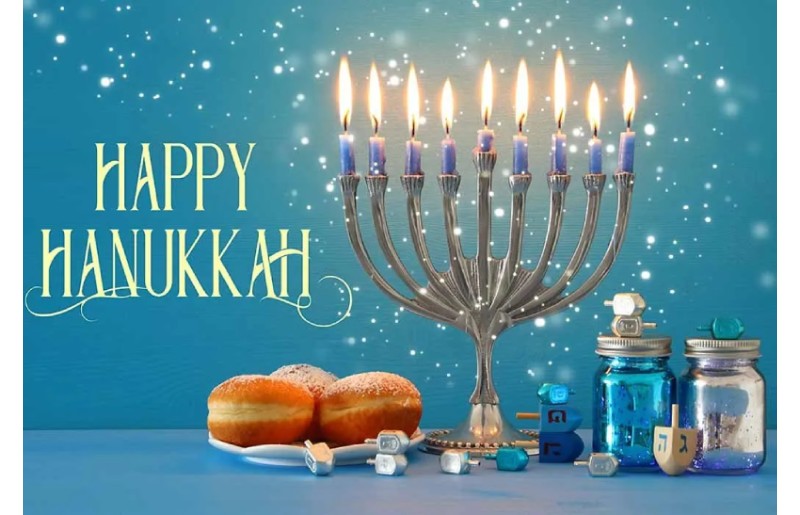
The Festival of Lights is another name for the Jewish holiday Hanukkah, or Chanukah, which means “dedication” in Hebrew. This year, it starts at sundown on Thursday, December 7, and ends on the evening of Friday, December 15, eight days later.
Hanukkah is a Jewish holiday that the community celebrates joyfully. It commemorates the rededication of the Jerusalem Holy Temple and lasts for eight days. Chanukah, as it is also called in 2023, will be observed from December 7 to December 15. The Jewish holiday of Hanukkah is referred to as the Festival of Lights, much like Diwali.
A significant event in Jewish history is commemorated by the festival: the rededication of the second Temple in Jerusalem in the second century BC, which came about as a result of the Maccabees’ rebellion. In observance of the temple’s sacred menorah being miraculously rekindled with a small amount of oil that is said to have lasted eight days, those celebrating light candles on a menorah on each day of the festival – one on the first day, two on the second, and so on.
According to the Hebrew calendar, the eight-day period begins on the 25th day of the Kislev month. This festival is observed by Jews around the world with candles, prayers, and sweets. The traditions of making potato pancakes, eating donuts, and lighting candles every night are what give this occasion its significance. It is essential to use oil when preparing food to celebrate Hanukkah.
In addition, Hanukkah is observed by gift-giving, traditional fatty foods like latkes (potato fritters) and sufganiyot (doughnuts), and games with a spinning top known as a dreidel.
In Jewish homes all across the world, Hanukkah, also known as the Festival of Lights, takes center stage as the winter nights grow longer and the calendar approaches December 7.
Hanukkah is an eight-night celebration rich in history and customs that begins at dusk on Thursday, December 7 and ends at nightfall on Friday, December 15.
In the Hebrew calendar, Hanukkah also spelled Chanukah, is observed on the 25th of Kislev, which usually falls in November or December.
Known as the Feast of Dedication or the Festival of Lights, it commemorates the rededication of the Jerusalem Holy Temple following the Maccabean uprising against the Greek-Syrian army.
For the Jewish community, Hanukkah is a holiday with great cultural and historical significance that lasts for eight nights and days.
The celebration honors the tenacity and the remarkable longevity of the Menorah, which was lit with a small amount of oil and surprised everyone by remaining lit for eight nights.
The custom of lighting the Menorah one candle at a time is central to the Hanukkah celebration. Every Jewish family observes a ritual in which they light candles, adding one each night.
It is customary to recite the Shehecheyanu, the blessing recited the first time a celebration is held each Jewish calendar year, in tandem with the lighting process on the first night of Hanukkah to foster a moment of reflection.
With its eight branches, the Menorah comes to represent continuity and hope.
Hanukkah is centered around the lighting of the Menorah, but the celebration also honors other beloved customs. Throughout the holiday, families trade gifts, and playing a game of dreidel—a spinning top with Hebrew characters—adds excitement.
The main attraction is the food; potato latkes, chocolate gelt coins, and sufganiyot (donuts filled with jelly) are staples of the festivities.
Despite what many people think, giving gifts to consumers is not a custom associated with Hanukkah.
Rather, the miraculous event is symbolized by the candles on the menorah.
Giving traditionally involves charitable giving, a nod to the past requirement that everyone, even the less fortunate, have enough money to buy candles.
Children also receive Hanukkah gelt (money), and games involving the dreidel—a four-sided spinning top—bring a lighthearted element to the celebrations.
The books of 1 and 2 Maccabees contain the historical account of Hanukkah’s origins, according to Baptist Standard, which also noted that Christians are free to observe the Jewish holiday. Since the event falls within the same December month on the Gregorian calendar, both Christians and Jews are welcome to celebrate it. The Bible makes mention of Hanukkah.
Fascinatingly, the sitcom ‘Friends’ also discusses the Jewish holiday. Do you recall when Ross Geller’s character David first introduced Ben to Hanukkah? In the iconic and hilarious Holiday Armadillo scene, Ross not only wished the young child a happy Hanukkah but also gave him gifts on Christmas Eve, explaining that Santa was on vacation and had sent him to deliver the gifts. Ben immediately responded, saying, “I’m part Jewish.”
A Young Entrepreneur’s Visionary Talks with a Global Economic Leader Signal a Bold Future In… Read More
Saving money is a goal shared by all business owners. Some costs can be cut… Read More
Switching to solar energy is a smart financial move for most homeowners, but understanding the… Read More
Access to pharmacy services has evolved significantly, driven by technological advancements and changing patient needs.… Read More
The Sim Corder/Harrison Mill represents an enduring symbol of American ingenuity, community, and progress. As… Read More
A beautiful and lively garden can add life to your outdoor space and make it… Read More